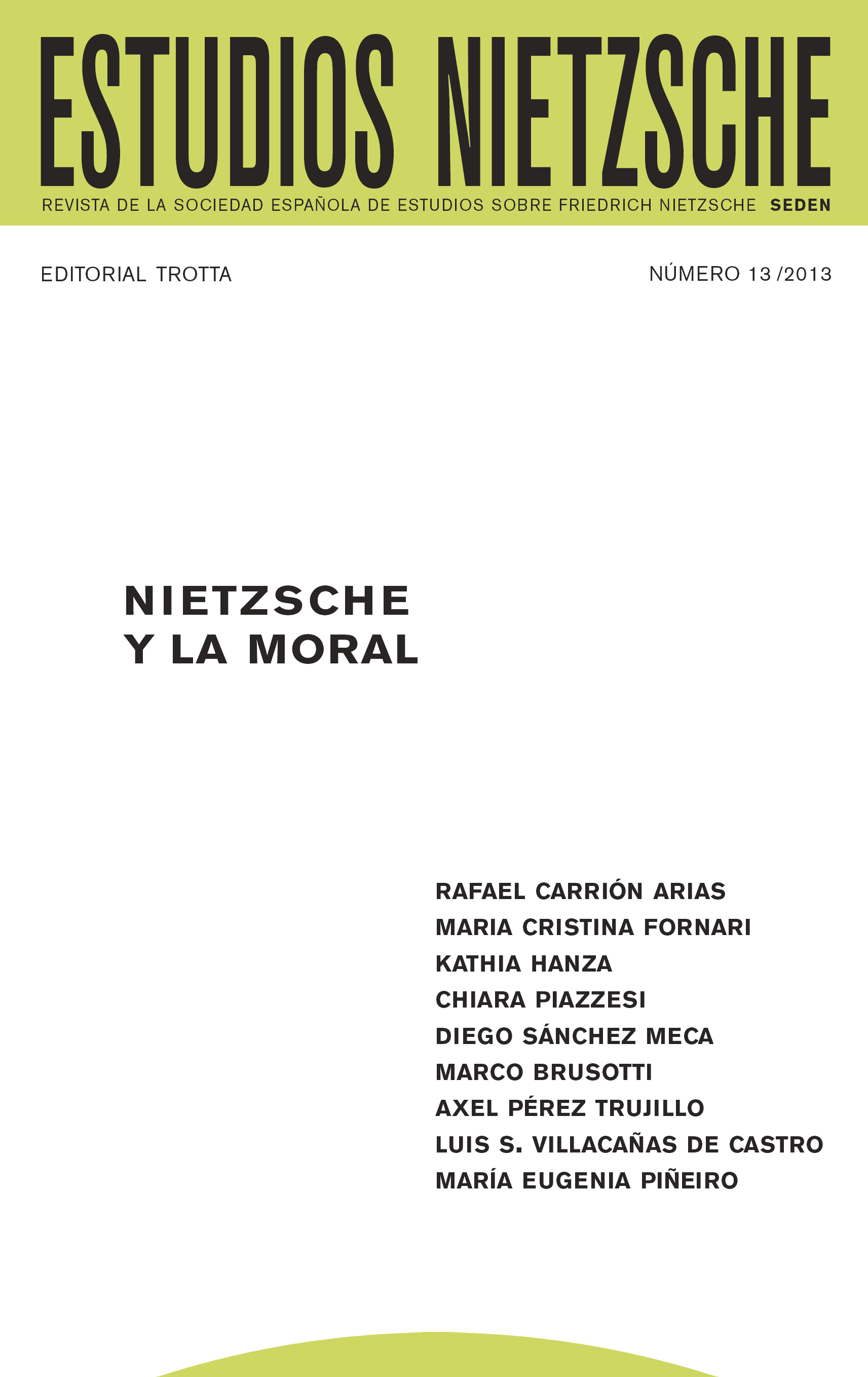For a Physiology of the Genealogy
DOI:
https://doi.org/10.24310/EstudiosNIETen.vi13.10693Keywords:
genealogy of morals, physiology, psychologyAbstract
The Genealogy of Morals is explicitly a polemical work, seeking to illustrate the origin of the cornerstones of modern morality. But according to the conclusions reached with Nietzsche’s doctrine of the will to power, we can understand it as a sign of the Lebens-form that its author represents at that moment. The task of clarifying where the founda- tion of our value positions lies is in fact entrusted to the physiologist: genealogy, with its examples of «distorted morphologies», not only plays down moral systems revealing their historical origin, but shows the psychological and physiological system that is the origin and basis of morality itself.
Downloads
Metrics
References
Acampora, C.D., «Forgetting the subject», en S. V. Hicks - A. Rosenberg (ed.), Reading Nietzsche at the margins, West Lafayette (IN): Purdue Univ. Press, 2008,.
Clark, M., «On the Rejection of Morality: Bernard Williams’s Debt to Nietzsche», en R. Schacht (ed.), Nietzsche’s Postmoralism, Essays on Nietzsche’s Prelude to Philosophy’s Future, Cambridge Univ. Press, 2001, pp. 100-122.
Derrida, J., Espolones. Los estilos de Nietzsche, Valencia: Pre-Textos, 1981.
Fornari, M. C., La morale evolutiva del gregge. Nietzsche legge Spencer e Mill, Pisa 2006.
Fornari, M.C., ««And so I Will Tell Myself the Story of my life». Nietzsche in His Last Letters (1885-1889)», en J. Constancio - M.J. Mayer Branco (ed.), As the Spider Spins. Essays on Nietzsche’s Critique and Use of Language, Berlin: De Gruyter, 2012, pp. 281-296.
Foucault, M., Nietzsche, la genealogía, la historia, tr. J. Vázquez Pérez, Valencia: Pre-Textos, 1992, pp. 45-72.
Gori, P., - C. Piazzesi, comentario a F. Nietzsche, Crepuscolo degli idoli, Roma: Carocci, 2012.
Gori, P., Nietzsche e la filosofia naturale di Boscovich, Nápoles: La Città del Sole, 2007.
Guyau, J-M. ,Esquisse d’une morale sans obligation ni sanction, Paris 1885.
Janaway, C., «Naturalism and Genealogy», en K. Ansell-Pearson (ed.), A Companion to Nietzsche, Oxford Univ. Press, 2005, pp. 337-352
Kail, P. J. E., «Nietzsche and Hume: Naturalism and Explanation»: The Journal of Nietzsche Studies 37 (2009), 5-22.
Leiter, Brian, Nietzsche on Morality, London: Routledge, 2002.
Nehamas, A., Nietzsche, la vida como literatura, tr. R. García Rodríguez, Madrid: Ediciones Turner, 2002.
Nietzsche, F., Obras Completas, I-IV (OC ). Director ed. Diego Sánchez Meca. Madrid: Tecnos, 2011-2016
Nietzsche, F., Correspondencia I-VI. (CO). Director ed. Luis E. de Santiago Guervós. Madrid : Trotta, 2005- 2012.
Nietzsche, F., Fragmentos Póstumos I-IV (FP). Director ed. Diego Sánchez Meca. Madrid: Tecnos, 2006-2010.
Sokologorsky, I., «Le fil conducteur du corps selon Nietzsche»: Alvearium 5 (2012), 63-79.
Thierry, M., «Généalogie, critique de la responsabilité morale et constitution de la subjectivité selon Nietzsche», Revue des sciences philosophiques et théologiques 94 (2010), 671-689.
Thüring, H., Geschichte des Gedächtnisses. F. Nietzsche und das 19. Jahrhundert, München: Fink, 2001.
Williams, B., Verdad y veracidad. Una aproximación genealógica, Barcelona: Tusquets, 2006.
Wotling, P., La philosophie de l’esprit libre. Introduction à Nietzsche, Paris: Flammarion, 2008.
Downloads
Published
How to Cite
Issue
Section
License
As of issue 21 (2021) this journal is published only in open access (diamond route).
From that number 21, like the previous numbers published in NIETZSCHE STUDIES, they are subject to the Creative Commons Acknowledgment-NoComercia-ShareIgual 4.0 license, the full text of which can be consulted at <http://creativecommons.org/licenses/by-nc-sa/4.0 >
It is the responsibility of the authors to obtain the necessary permissions of the images that are subject to copyright.
This work is licensed under a Creative Commons Attribution-NonCommercial-ShareAlike 4.0 International License.
Copyright generates two different rights: moral rights and patrimonial rights that EJFB recognizes and respects. Moral rights are those relating to the recognition of the authorship. They are rights of a personal nature that are perpetual, inalienable, unseizable and imprescriptible as consequence of the indivisible union of the author and his/her work.
Patrimonial rights are those that can be derived from the reproduction, distribution, adaptation or communication of the work, among others.







11.png)
